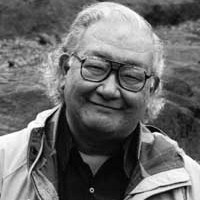Headwaters by Navarre Scott Momaday: Summary and Critical Analysis
The title in the poem Headwaters by Navarre Scott Momaday suggests the current water which is wild at source and slow at the plain. This poem depicts the quest for the root to Native American people who are subjected to remain under the control and influence of British migrated people in America. Root searching is the main theme of this poetry and the poet has used the pastoral setting to indicate the contemporary human situation.

N. Scott Momaday (Born in 1934)
The setting of this poem is the Intermountain (valley) and time is afternoon; 12 pm. A log is lying, uprooted, midday in a valley, there are insects, this log is decaying, but still from its root water is brimming; coming out. It's noon at the Intermountain and there is a scant telling of marsh; there is hardly any wetland.
Headwaters begins in a typically meditative manner. But the beginning is also a kind of descriptive setting: "Noon in the intermountain plain/ There is scant telling of the marsh." The lines sound as if the speaker has been thinking over for some time and then begins to speak to himself. The dash (—) in the second line also indicates the improvisatory quality of the expression. The persona then notices a log-, a dead and "hollow and weather-stained" dead tree. This ancient tree looks decayed, and there is an insect at one end. 'Yet", says the speaker, "waters rise against the roots". This rising of waters at the root is a symbol of the fountain of blood and spirituality. The next moment he notices that amidst the dead-looking things, there is something that "moves". He states at the end of the poem that: "What moves on this archaic force/ was wild and welling at the source'. There is still that dynamism and life in the stream of the culture and spirit of the Kiowa, in the fountains of the spirituality that sustain their culture.
"Headwaters" is a meditative poem in which Momaday's persona meditates on the fountain near the lake in the Tsoai-Talee Mountain from which the Kiowa tribe is believed to have come. Momaday here not only believes and regards the myth of the Kiowa origin, he also imaginatively goes to the very place and 'feels' what that fountain of the Kiowa blood is as originating from the very rock of America. The Kiowa tribe of the Red Indians believes that their tribe was born from the earth, specifically from a small spring near a lake in the middle of two mountains (the Tsoaitalee) in Oklahoma. The poet imagines being there one sunny afternoon; he seems to be worried about the drying of the Indian blood as it flows down and mixes with other bloods. Momaday is a mixed blood Red Indian Kiowa. When the persona of this poem ponders over the waters of the evolutionary springs, his anxiety of losing the originality of the Kiowa blood is relieved because he suddenly realizes that the water of the pool is actually dynamic, and it is moving down. This symbolically means that the Red Indian Kiowa blood has been mixed and though it seems to have been lost and stopped down the way, it is still moving; his own blood is still active like the pool that only seems to be still but is actually supplying water to the stream flowing down and to the vast rivers still down the plains. What matters is that the fountain is still active. This fountain also symbolizes the Kiowa spirit, and their faith. As long as the native faith and spirituality remains the foundation of their blood is as good as ever.
He uses ‘there’ instead of ‘here’ which implies a distance between the speaker and the land he is talking about. Speaker belongs to Kiowa tribe and he finds himself far from his original land America after European came. He too finds the land dry because of the loss of its natural beauty. The log in the poetry stands for a Native American tribe. Temporarily, it has become lifeless. It is “weather stained” means it has been exposed to all kinds of weather. This suggests the Native American have been there in America since time immemorial.
Moss and insect are the cause of its lifelessness. Then moss and insect symbolically stand for European invaders. Because of their invasion, Native American identity has become identity-less. Momaday argues that the natives have been together with the pains and pleasure of America. Therefore, they deserved to be the first class civilians of the nations. From the roots of this log water is brimming. Then Momaday compares Natives to the headwaters which becomes slow when it comes to the plain. At the root the headwaters are wild, stronger and archaic. This means, though Native Americans look weak outside because of subjugation, they are strong at the source just like headwaters. Its root is strong since time immemorial. After all this poetry is a challenge to the Euro American tendency of undermining the natives. This poem tells us how the Native American views the land and his eternal relation to it; they are intended to throw light on the present poem “Headwaters” which is a meditation of the persona on his ancestry that evolved from the lake and land in the mountain where he is seated.
Cite this Page!
Sharma, Kedar N. "Headwaters by Navarre Scott Momaday: Summary and Critical Analysis." BachelorandMaster, 15 Nov. 2013, bachelorandmaster.com/britishandamericanpoetry/headwaters.html.
